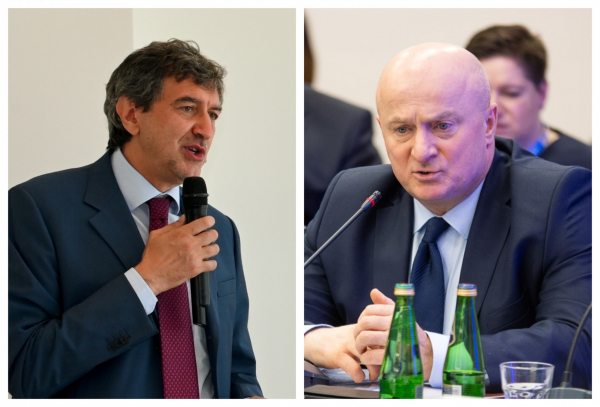
On 17 November 2021, ECR Group COTER Deputy Coordinator Jarosław Stawiarski, President of the Lubelskie Region (Poland), and ECR Group Vice-President Marco Marsilio, President of the Abruzzo Region (Italy), participated in the event The role and importance of rail transport in the regions of Europe. Building efficient regional rail-based transport systems, organised by the East Poland House in Brussels, Polish State Railways and the European Committee of the Regions (COTER Commission).
The conference was chaired by Libor Lochman, Counsellor to the Chair of the Board of Czech Railways, and gathered local and regional authorities and experts on EU transport, including from the European Commission: Elżbieta Łukaniuk, Member of the Cabinet of Adina Vălean – Commissioner for Transport Policy, Mirosław Dybowski from the Directorate-General for Regional and Urban Policy (DG REGIO) and Katarzyna Szyszko from the Directorate-General for Mobility and Transport (DG MOVE).
Mr Stawiarski, CoR rapporteur on the opinion on the European Year of Rail 2021, opened the event, highlighting the importance of the European Year of Rail 2021 as an opportunity to promote rail as the mode of transport of the future. He referred to the need to allocate more funding to increase the competitiveness of railways and help build a strong market position, increase travel comfort and shorten travel time. He explained that infrastructure investments for the modernisation of railways are very costly, but they are also very justified by the long-term economic and environmental benefits.
Mr Stawiarski, President of the Lubelskie Region, stressed that the justification for the development of a network of connections and support for rail transport is indisputable since the railway is one of the safest and most environmentally friendly means of transport: "The future of transport is undoubtedly rail. In passenger transport, we need fast interregional rail services connecting the largest cities and the integration of railways with public transport systems in urban agglomerations. In freight transport, rail is also an important element. We need combined transport using intermodal loading units and an economically viable mode of transport for more modern and less polluting freight transport."
Speaking in the first panel on the role and importance of railway transport in the regions, Mr Marsilio, President of the Abruzzo Region, spoke about the trans-European transport networks (TEN-T), which are necessary to connect regions of Central-Southern Italy, including Abruzzo: "Our task is to restore the competitiveness of our economy and improve the quality of life of our citizens."
He also highlighted the need to ensure better connectivity for EU regions: "Only through more organic connectivity, both within and between European regions, will we be able to facilitate the circulation of goods and bridge the infrastructural gap." Touching upon future plans of the Abruzzo Region, he referred to the extension of the Adriatic backbone to Bari, the inclusion of the Ortona Port, the Rome-Teramo motorway and the Interporto d'Abruzzo in the core network and also the plan for a secondary urban node of Pescara.
The conference was an opportunity to summarise the achievements and discuss the challenges of the transport sector and present plans for developing the railways of the future, based on the targets included in the European Green Deal and the European Strategy for Smart and Sustainable Mobility. It was organised as part of the European Year of Rail 2021 initiative to encourage efforts undertaken by the EU, Member States and regional and local authorities to increase the share of rail in EU transport.

